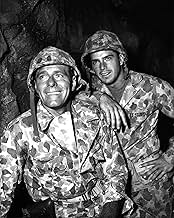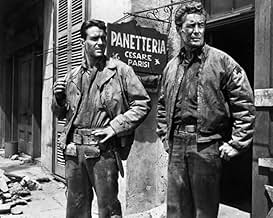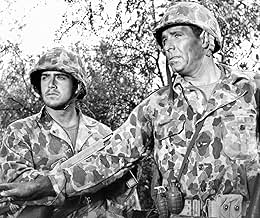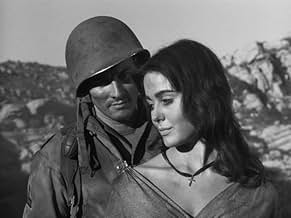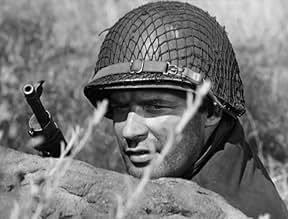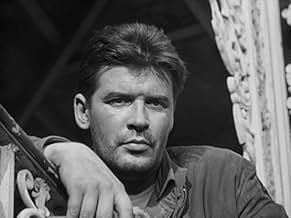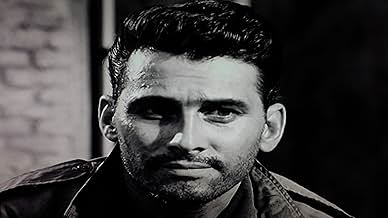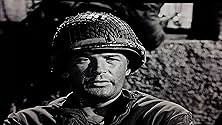Ajouter une intrigue dans votre langueThe 36th infantry is fighting its way through Italy under the spirited leadership of Captain Jim Benedict. His men include flirt D'Angelo, who carries his guitar along, plus pals Lucavich an... Tout lireThe 36th infantry is fighting its way through Italy under the spirited leadership of Captain Jim Benedict. His men include flirt D'Angelo, who carries his guitar along, plus pals Lucavich and Hanson. McKenna is the free wheeling Sergeant.The 36th infantry is fighting its way through Italy under the spirited leadership of Captain Jim Benedict. His men include flirt D'Angelo, who carries his guitar along, plus pals Lucavich and Hanson. McKenna is the free wheeling Sergeant.
Parcourir les épisodes
Avis en vedette
Just a quick correction to one of the other comments....The Gallant Men took place in Italy, not in the Pacific. Combat was set in France.
I was nine when this show aired...and the son of a WWII vet....and loved the show. Not as much as Combat....but well enough. During those few years...8 to 11 or so....I would join my pals of the same age group on weekends....and all thru the summer....and "play army"in the woods across the street....with stuff we got at the War Surplus store....or got from our dads'.....and back then..toy stores sold the most amazingly realistic toy weapons...I had a very detailed plastic replica of the Thompson submachine gun...as well as a replica of the old Springfield rifle. We were inspired by both Combat and The Gallant Men to play the most realistically detailed "war games"....as only innocent 10 year-olds can...today was Normandy...next week...the French hedge rows....in winter..The Battle of The Bulge...in the heat of summer... Guadalcanal ...we had a blast.
That was 1962-3-4......
In a few short years...by 1968...war was no longer a game for us....but but a real event on TV every day...that we had to begin to reckon with.
As sobering as that turn of history was....I will never forget the the thrill of our games....perhaps because we aspired to be like our dads'...til life changed for all of us.
I was nine when this show aired...and the son of a WWII vet....and loved the show. Not as much as Combat....but well enough. During those few years...8 to 11 or so....I would join my pals of the same age group on weekends....and all thru the summer....and "play army"in the woods across the street....with stuff we got at the War Surplus store....or got from our dads'.....and back then..toy stores sold the most amazingly realistic toy weapons...I had a very detailed plastic replica of the Thompson submachine gun...as well as a replica of the old Springfield rifle. We were inspired by both Combat and The Gallant Men to play the most realistically detailed "war games"....as only innocent 10 year-olds can...today was Normandy...next week...the French hedge rows....in winter..The Battle of The Bulge...in the heat of summer... Guadalcanal ...we had a blast.
That was 1962-3-4......
In a few short years...by 1968...war was no longer a game for us....but but a real event on TV every day...that we had to begin to reckon with.
As sobering as that turn of history was....I will never forget the the thrill of our games....perhaps because we aspired to be like our dads'...til life changed for all of us.
The pilot of "Combat" was not as well made as the pilot of "The Gallant Men".
Robert Altman directed the pilot of "The Gallant Men". He was key in casting all the regulars. Boris Sagal ("Rich Man, Poor Man") directed the pilot for "Combat", but never did another episode. The producers of "Combat" hated the look of their pilot and loved the look of the "Gallant Men" pilot. The producers convinced Altman to move over to "Combat" as a producer-writer-director. Altman did some of his best work on the first season of "Combat", and he got the series off to a superb start. Altman says on a "Combat" DVD commentary of an episode with Albert Salmi that he never got better than that as a director. Altman also said that "Combat" had a better cast than "The Gallant Men", even though he cast "The Gallant Men" and had nothing to do with casting "Combat".
"The Gallant Men" was probably suggested by "The Story of G.I. Joe" (1945) where Burgess Meredith played war correspondent Ernie Pyle and Robert Mitchum played an infantry captain. In "The Gallant Men", Robert McQueeney was top billed as war correspondent Conley Wright.
"The Gallant Men" focused on a company while "Combat" focused on a single squad. The squad level turned out to be the ideal vehicle to tell war stories and to allow the viewer to get close to the characters. "Combat" also benefited from having one of the 1960's best series performances: Vic Morrow as Sergeant Saunders. Morrow was nominated for an Emmy for the first season of "Combat", but lost to E.G. Marshall ("The Defenders"). "Combat" also hired superb guest stars that Warner Brothers would never pay up for: Jeffrey Hunter, Lee Marvin, James Coburn, Rip Torn, John Cassavetes and many others. And finally, "Combat" paid for better writers and wound up with much better scripts.
Warner Brothers was a very cheap outfit, although they often did manage to make compelling shows.
Robert Conrad gave an excellent guest star performance on "The Gallant Men" as a sergeant who was the brother of series hero Captain Benedict (well played by William Reynolds.) Robert Conrad might have been brilliant as a tough squad leader, maybe even as good as Vic Morrow. Conrad should have been brought in as the new series star. The show should have focused on Conrad's squad rather than the company. The most appealing regular on "The Gallant Men" was 23-year old Roger Davis as Private Gibson. Conrad could bring Gibson along from episode to episode until finally Gibson is given a battlefield commission and becomes Conrad's platoon leader. This could have led to a strongly written and played relationship that could have given the show a dramatic center-something it badly needed.
Robert Altman's original conception for "The Gallant Men" was to kill off the regulars from week to week. This was a fascinating idea that could have made the series very realistic and emotionally involving. If Robert Altman had stayed on board, "The Gallant Men" might have given "Combat" a run for its money.
Robert Altman directed the pilot of "The Gallant Men". He was key in casting all the regulars. Boris Sagal ("Rich Man, Poor Man") directed the pilot for "Combat", but never did another episode. The producers of "Combat" hated the look of their pilot and loved the look of the "Gallant Men" pilot. The producers convinced Altman to move over to "Combat" as a producer-writer-director. Altman did some of his best work on the first season of "Combat", and he got the series off to a superb start. Altman says on a "Combat" DVD commentary of an episode with Albert Salmi that he never got better than that as a director. Altman also said that "Combat" had a better cast than "The Gallant Men", even though he cast "The Gallant Men" and had nothing to do with casting "Combat".
"The Gallant Men" was probably suggested by "The Story of G.I. Joe" (1945) where Burgess Meredith played war correspondent Ernie Pyle and Robert Mitchum played an infantry captain. In "The Gallant Men", Robert McQueeney was top billed as war correspondent Conley Wright.
"The Gallant Men" focused on a company while "Combat" focused on a single squad. The squad level turned out to be the ideal vehicle to tell war stories and to allow the viewer to get close to the characters. "Combat" also benefited from having one of the 1960's best series performances: Vic Morrow as Sergeant Saunders. Morrow was nominated for an Emmy for the first season of "Combat", but lost to E.G. Marshall ("The Defenders"). "Combat" also hired superb guest stars that Warner Brothers would never pay up for: Jeffrey Hunter, Lee Marvin, James Coburn, Rip Torn, John Cassavetes and many others. And finally, "Combat" paid for better writers and wound up with much better scripts.
Warner Brothers was a very cheap outfit, although they often did manage to make compelling shows.
Robert Conrad gave an excellent guest star performance on "The Gallant Men" as a sergeant who was the brother of series hero Captain Benedict (well played by William Reynolds.) Robert Conrad might have been brilliant as a tough squad leader, maybe even as good as Vic Morrow. Conrad should have been brought in as the new series star. The show should have focused on Conrad's squad rather than the company. The most appealing regular on "The Gallant Men" was 23-year old Roger Davis as Private Gibson. Conrad could bring Gibson along from episode to episode until finally Gibson is given a battlefield commission and becomes Conrad's platoon leader. This could have led to a strongly written and played relationship that could have given the show a dramatic center-something it badly needed.
Robert Altman's original conception for "The Gallant Men" was to kill off the regulars from week to week. This was a fascinating idea that could have made the series very realistic and emotionally involving. If Robert Altman had stayed on board, "The Gallant Men" might have given "Combat" a run for its money.
The Gallant Men was Warner Brother's contribution tot he War genre of the early 60's, featuring many of the same contract players who had appeared in their western and detective series. It was a sort of rival of Combat, which premiered on the same network in the same year but which was produced by a different company. I was a kid then and my family started out watching The Gallant Men but began watching Combat when the former was canceled. I liked The Gallant Men very much but spent much of my childhood humming the "Combat March" with my friends, who always instantly recognized it.
I'd have to pick Combat as the better show because it's more consistently good but they shows are by their nature very similar and a good "Gallant Men" is as good as a good Combat. It's just that there are fewer of them. The writing, directing and acting on Combat is more consistently good. The characters are a little stronger overall, as well. Vic Morrow's Sgt. Chip Saunders is one oft he classic TV characters of all time. Rick Jason's Lt. Gil Hanley is almost as good, (but forgotten by many, for some reason). Jack Hogan's Kirby is also memorable. Pierre Jalbert as Caje and Dick Peabody as Littlejohn, (and he's the right size for it), offer strong support. The one thing The Gallant Men has is a sardonic narrator, Robert McQueeney's war correspondent, Conley Wright. William Reynolds is a forceful Captain Benedict. Robert Ridgely is OK as Lt. Kimbro. Eddie Fontaine is good as the wheeler's dealer of the unit, Pvt. DeAngelo, but not as good as Hogan's similar Pvt. Kirby on Combat. Roland LaStarza, a former boxer who once got KO'ed by Rocky Marciano, has some good comic moments as Lucavich, but isn't much of an actor. (In one show, the soldiers talk about what they expected war to be like. Lucavich said he thought they might name a country after him. "A country named Lucavich?!?", says DeAngelo.) Both shows were popular at the time but ABC decided they needed only one war show on it's schedule and Combat was getting the better ratings at the time so The Gallant Men was canceled after only one year. It was very disappointing to me. I had hopes that the two shows would work their way to the end of the war and meet up with each other in Germany. As it was The Gallant Men never made it to the end of the war and the Combat crew fought on for 5 years, which hardly seems fair, considering that the actually length of time from the Normandy invasion to V-E Day was only ten months. No wonder they complained about the war dragging on.
One thing the two shows had in common was the dilemma they faced in each battle. Obviously, a fire fight between a squad of American soldiers who are regulars in a TV show and a squad of German troops who are not is going to be rather one sided. The war could not have been that easy. So, if you see a guy in an American uniform who isn't one of the regulars, kiss him goodbye...
I'd have to pick Combat as the better show because it's more consistently good but they shows are by their nature very similar and a good "Gallant Men" is as good as a good Combat. It's just that there are fewer of them. The writing, directing and acting on Combat is more consistently good. The characters are a little stronger overall, as well. Vic Morrow's Sgt. Chip Saunders is one oft he classic TV characters of all time. Rick Jason's Lt. Gil Hanley is almost as good, (but forgotten by many, for some reason). Jack Hogan's Kirby is also memorable. Pierre Jalbert as Caje and Dick Peabody as Littlejohn, (and he's the right size for it), offer strong support. The one thing The Gallant Men has is a sardonic narrator, Robert McQueeney's war correspondent, Conley Wright. William Reynolds is a forceful Captain Benedict. Robert Ridgely is OK as Lt. Kimbro. Eddie Fontaine is good as the wheeler's dealer of the unit, Pvt. DeAngelo, but not as good as Hogan's similar Pvt. Kirby on Combat. Roland LaStarza, a former boxer who once got KO'ed by Rocky Marciano, has some good comic moments as Lucavich, but isn't much of an actor. (In one show, the soldiers talk about what they expected war to be like. Lucavich said he thought they might name a country after him. "A country named Lucavich?!?", says DeAngelo.) Both shows were popular at the time but ABC decided they needed only one war show on it's schedule and Combat was getting the better ratings at the time so The Gallant Men was canceled after only one year. It was very disappointing to me. I had hopes that the two shows would work their way to the end of the war and meet up with each other in Germany. As it was The Gallant Men never made it to the end of the war and the Combat crew fought on for 5 years, which hardly seems fair, considering that the actually length of time from the Normandy invasion to V-E Day was only ten months. No wonder they complained about the war dragging on.
One thing the two shows had in common was the dilemma they faced in each battle. Obviously, a fire fight between a squad of American soldiers who are regulars in a TV show and a squad of German troops who are not is going to be rather one sided. The war could not have been that easy. So, if you see a guy in an American uniform who isn't one of the regulars, kiss him goodbye...
Unlike some of the other reviewers, I (at 13) felt that "The Gallant Men" was a better show than "Combat!" (at least at that time), probably because it was a little more cerebral.
In my 8th grade English class (during the 1962-1963 season) I had the good fortune to have Roger Davis (Gibson) speak to us. (His kid brother was in our class.) He explained at the time that "The Gallant Men" was produced by Warner, while "Combat!" was produced by a production company owned by ABC, so likely "The Gallant Men" was fated to be cut at the end of the season. His prediction was accurate.
(He also explained how the producers kept salary demands in line -- any actor causing trouble could be written out as quickly as a gun can fire.)
In my 8th grade English class (during the 1962-1963 season) I had the good fortune to have Roger Davis (Gibson) speak to us. (His kid brother was in our class.) He explained at the time that "The Gallant Men" was produced by Warner, while "Combat!" was produced by a production company owned by ABC, so likely "The Gallant Men" was fated to be cut at the end of the season. His prediction was accurate.
(He also explained how the producers kept salary demands in line -- any actor causing trouble could be written out as quickly as a gun can fire.)
This was a fun show to watch!! Not has good as Combat or 12 O'Clock High, but quite enjoyable. I thought William Reynolds as Capt. Jim Benedict and Robert McQueeney as Conley Wright were pretty good. Most of the story lines were predictable, but nevertheless fun to watch. Had some really great guest stars( Robert Conrad, Peter Breck, Peter Brown, Guy Stockwell and Van Williams to name a few). This was a Warner Brothers show so I guess that they used most of the T.V actors that were under contract to them and starring in shows of their own as guest stars to help boost the ratings..I also thought that it had the most gut-wrenching theme song that I had ever heard!( I was 8 years old at the time and I damn-near cried every time I heard that song at the end of each episode). The action was enjoyable, but not of the same quality as Combat. This show was canceled after one season. With some better writing, this may have lasted longer.
Le saviez-vous
- ConnexionsReferenced in Svengoolie: The Land Unknown (2014)
Meilleurs choix
Connectez-vous pour évaluer et surveiller les recommandations personnalisées
- How many seasons does The Gallant Men have?Propulsé par Alexa
Détails
- Durée1 heure
- Couleur
- Rapport de forme
- 1.33 : 1
Contribuer à cette page
Suggérer une modification ou ajouter du contenu manquant

Lacune principale
By what name was The Gallant Men (1962) officially released in Canada in English?
Répondre
